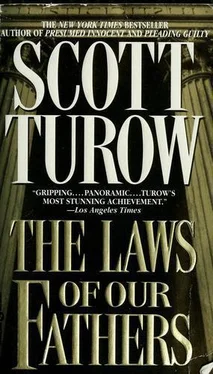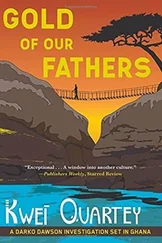Scott Turow - The Laws of our Fathers
Здесь есть возможность читать онлайн «Scott Turow - The Laws of our Fathers» весь текст электронной книги совершенно бесплатно (целиком полную версию без сокращений). В некоторых случаях можно слушать аудио, скачать через торрент в формате fb2 и присутствует краткое содержание. Жанр: Криминальный детектив, на английском языке. Описание произведения, (предисловие) а так же отзывы посетителей доступны на портале библиотеки ЛибКат.
- Название:The Laws of our Fathers
- Автор:
- Жанр:
- Год:неизвестен
- ISBN:нет данных
- Рейтинг книги:5 / 5. Голосов: 1
-
Избранное:Добавить в избранное
- Отзывы:
-
Ваша оценка:
- 100
- 1
- 2
- 3
- 4
- 5
The Laws of our Fathers: краткое содержание, описание и аннотация
Предлагаем к чтению аннотацию, описание, краткое содержание или предисловие (зависит от того, что написал сам автор книги «The Laws of our Fathers»). Если вы не нашли необходимую информацию о книге — напишите в комментариях, мы постараемся отыскать её.
The Laws of our Fathers — читать онлайн бесплатно полную книгу (весь текст) целиком
Ниже представлен текст книги, разбитый по страницам. Система сохранения места последней прочитанной страницы, позволяет с удобством читать онлайн бесплатно книгу «The Laws of our Fathers», без необходимости каждый раз заново искать на чём Вы остановились. Поставьте закладку, и сможете в любой момент перейти на страницу, на которой закончили чтение.
Интервал:
Закладка:
'Yeah, you know.' 'What kind of help?' 'Help. H, e, l, p.' 'As his probation officer?' 'Sort of. It's not important.'
'Wait, wait. Nile. Pay attention. Look at me.' His father was at the kitchen table. 'What are you doing?' 'Eddgar – '
'Wait. What are you doing, Nile?'
Fuck you doing? He stood in thefiery furnace. Fuck you doing? The question of his life. Eddgar
You could never really judge Eddgar without seeing this. That's what he told himself. Those who scorned him – there were many, the reporters, the statehouse guttersnipes, the ugly claque tittering about Loyell Eddgar and his life of endless plotting – they could never really take account of him without seeing him as he lived here, in a three-room apartment carved out of the large house. He'd bought this house for June twenty-five years ago in the most grandiose gesture he could conceive of to reflect personal reform. It never mattered to her. She left anyhow, and over time he cut away the space. He had student roomers during the term, and in the winter a flophouse in the basement for homeless men. But privacy, solitude, remained precious. Those parts of the house where others dwelled were sealed off from the smaller area Eddgar and Nile occupied.
Eddgar's rooms were spartan. He never bothered with carpets. The hardwood was chilly. He still fell wearily upon the same Danish Modern sofa which had traveled from their place in Damon, its orange cushions covered with Guatemalan prints. There was nothing on the walls, only a single picture in a frame on an old maple coffee table: Nile, June, Eddgar in the late sixties, the boy with flossy curls, a hand upraised in childish jubilance. Bulwarks of books and papers were piled neatly. In his bedroom, the spread was tucked precisely beneath the outline of the pillow, leaving no sign of the man who was here in the middle of the night with the covers in turmoil.
What did he think then? Did he wake with longing? And for whom? That is what people wanted to know, he realized. But he could not fully say himself. He recalled coming to in that state and instantly feeling somehow thwarted and ashamed, his mind quickly diverted. He spoke then to God, as he had done in moments of utter privacy all his life. For years – the bad years as Eddgar thought of them, when so much seemed beyond his control – in those years he would hide from himself the fact he did this, so that the disarming knowledge that he was still secretly conducting this conversation with Him would come flying at Eddgar out of nowhere, like a levitating object at a seance. He would think, How can it be? But he never stopped. For one reason. He listened. At that age offour or five or six, somewhere far back there, one thick summery Southern night, with the locusts sawing themselves in shrieks of desiccated passion, the intimation came to Eddgar of the vast presence above who heard with welcome Eddgar's inner thoughts. God listened. Not always with patience or admiration. At times, Eddgar grappled with God, as Jacob wrestled the angel. Sometimes in his dreams, Eddgar saw them locked together, tussling, their naked flanks sweat-glistered and etched in shadow. He felt the overheated breath, the ferocious violent embrace of God nearly squeezing life from him, a sort of ecstasy arising amid the pain.
Now fresh from bed, he imagined everything he must do today, how he would be in the world. He recollected meetings, a staff lunch, committee members he needed to persuade, calls to Farmers Alliance members downstate, a constituent requiring help at the U. Tonight he would speak at a dinner in the South End in DuSable at a Legal Aid Center function. Eddgar had gone for years – good folk, Irish, Italians, and Mexicans, organized around one of those parish priests, Father Halloran, still lean and energetic at sixty-four, who'd been there thirty years, full of hope, kindling kindness amid the lives that would stand parched and lonely without him. Halloran kept his parishioners supporting this little clinic where the poor received free advice about overbearing landlords, their sad divorces, the kids in trouble on the street. Eddgar loved these events, finding people, ordinary people, secretaries and shop-floor managers, who cared to see the world made better, whose feelings ran beyond the boundaries of their lives. Their kids came, too, half of them grown, moved off to the far-flung corners of the suburbs, but still drawn back to this, to the flame of their beliefs.
He would talk about the pure good of this enterprise. No sentiment. But he'd say that good faith and caring are not government responsibilities alone. And they'd ask: 'Senator Eddgar,' they'd ask, 'what else can we do? What can we do?' And for a minute, this hall, a basement room in a K. of C. Hall, a place with cheap paneling and magenta carpeting worn to a number of blackened spots, would be quiet. What can we do? The whole place would throb with the pained life of the poor. He did not know exactly what he'd say, but he savored the moment in prospect. In the statehouse, they could laugh at him all they liked, the staffers and media thugs could be smug, but this was still his work, still where he knew just who he was, when he felt both the torment of people warring all their lives against the dim weight of poverty and scorn, and the furious strength of his dedication to them.
They never understood, men like Hardcore, men like Huey, they never recognized that it was a thrill to Eddgar to see them – black men, powerful, rigid with anger. It thrilled him to think these men were the heirs, the successors of the beaten, woebegone souls he'd watched chop tobacco during his childhood, men and women who grasped the spiny stems Eddgar could not even touch, migrants, moving listlessly, hopelessly up the dusty roads, carrying with them the odor of the thick aromatic sap. He had loved those people, so cruelly thwarted by the likes of his father, adored them with a mighty, towering, limitless love. He did not love Hardcore or Huey. They did not want his love, which was one reason they frightened Eddgar, much as they frightened everybody else. But he was thrilled, because their strength, their anger equipped them to move forward in the world. Now we must move beyond anger. That is what he would say tonight. We must move on to gratitude, participation, responsibility. Wide awake, at the lee end of the night, he stared toward the ceiling fixture, the textured glass that captured the glaring light of two bulbs, and saw the brightness only as a tangible sign of his own commitments.
Downstairs, at this hour, past 5 a.m., he heard the ruckus of Nile readying himself for departure. He was gone early on these days to avoid the traffic. It was an hour and a half sometimes from Greenwood into Kindle Probation. He has been getting better, Eddgar thought, knowing he had told himself this nearly Nile's entire life. But it seemed to be true. He was less edgy, more responsive, holding this job, a real job, with which he seemed legitimately involved. Yes, all right, he was still under his father's guidance, still hovered over at moments like a small child. But he was working where there was so much good to be done. Eddgar proceeded downstairs to find his son in a denim shirt and a leather tie, eating cereal and watching the TV.
'Hey,' said Nile. His son still slept here two or three nights during the work week, if Eddgar was not downstate. Nile's place in town was a lonely closet. Nile also passed the weekends here. The boy, the man Nile had become, six foot one, sloppy with loose flesh, sprawled on the sofa, unshaved, unwashed, drinking name-brand beer in the living room downstairs and watching TV. They did not speak much. He was not sure what Nile wanted. Free food? A place to lounge and be looked after? There were a hundred sarcastic answers. But he welcomed the boy's presence. Eddgar liked to have him here, in sight. They both felt better that way. Eddgar had put on yesterday's shirt and found his notes in the pocket.
Читать дальшеИнтервал:
Закладка:
Похожие книги на «The Laws of our Fathers»
Представляем Вашему вниманию похожие книги на «The Laws of our Fathers» списком для выбора. Мы отобрали схожую по названию и смыслу литературу в надежде предоставить читателям больше вариантов отыскать новые, интересные, ещё непрочитанные произведения.
Обсуждение, отзывы о книге «The Laws of our Fathers» и просто собственные мнения читателей. Оставьте ваши комментарии, напишите, что Вы думаете о произведении, его смысле или главных героях. Укажите что конкретно понравилось, а что нет, и почему Вы так считаете.












